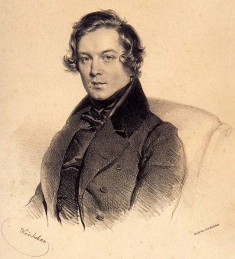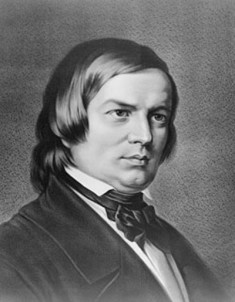| Robert Schumann | |
|---|---|
 |
|
| Composer | |
| Specialty | Symphonies, opera, orchestral, choral, chamber |
| Born | Jun. 8, 1810 |
| Died | Jul. 29, 1856 |
| Nationality | German |
Robert Schumann was born in Zwickau, Germany on June 8, 1810. His father was a book dealer and an author, so Schumann was surrounded by books throughout his childhood. As a result, he developed a deep love for reading and for writing. He also had a natural talent for music and took up the flute, cello and piano as a child. Becoming a composer was a natural next step.
Schumann’s Personal Life
Regardless of his natural talents and inclinations, Schumann’s parents aspired for him to become a lawyer, and he attended the University of Leipzig to study law. He was well aware that he had no interest in being a lawyer and simultaneously studied piano with an instructor, Friedrich Wieck, who had a daughter (Clara) nine years Schumann’s junior.
Robert and Clara fell in love and wanted to wed, but her father opposed the marriage and even took the matter to court. Nonetheless, love prevailed and the pair eventually married. Schumann was elated and inspired by his marriage and spent the first year following it composing. This year is now called Schumann’s Year of Song. Following that period, Schumann experienced several other lengthy song-writing binges.
In addition to Schumann’s spells of accelerated activity, he also seemed to experience a certain measure of social awkwardness. His contemporaries noted that he did not seem to enjoy conversation but was comfortable simply inhabiting space with others. This could result in lengthy periods of silence that made others uncomfortable, yet Schumann seemed to prefer this to talking.
Schumann’s Other Talents
Schumann was always very active and continued to pursue his other talents in addition to composition. He enjoyed writing and wrote poetry, prose, short stories and plays throughout his life. He also wrote articles as a music critic between 1830 and 1840. Many readers noted that his music critiques seemed almost like short stories due to his unique writing style.
Schumann was inspired by some of the popular writers of the day. Among them were ETA Hoffmann and Jean Paul Friedrich Richter. Their influence can be seen in both his writing and in his music. He was able to interpret their literary style into a musical format. This very imaginative treatment was difficult for audiences of his day to understand; however, today such pieces as the Kreisleriana Opus 16, written in 1838, are appreciated because of their eccentricities.
The Schumann Family
 In addition to his ambitions as an author and composer, Schumann aspired to become a concert pianist and devised his own method of practicing that involved weighting his fingers; however, his method backfired and resulted in injury that prevented him from playing. Clara Schumann was an accomplished pianist, though, and often performed his pieces in concert. Among them was a collection of pieces for children entitled Album for the Young, Opus 68.
In addition to his ambitions as an author and composer, Schumann aspired to become a concert pianist and devised his own method of practicing that involved weighting his fingers; however, his method backfired and resulted in injury that prevented him from playing. Clara Schumann was an accomplished pianist, though, and often performed his pieces in concert. Among them was a collection of pieces for children entitled Album for the Young, Opus 68.
Schumann had written these pieces for his own seven children. He took great delight in being a father and spent a lot of time with his children. He enjoyed taking them on nature walks, playing games with them and making music with them, for them and about them. These pieces were light, lively, entertaining and imaginative. Among them are Kinderszenen, Opus 15, which was written for adults to remind them of the innocence of childhood.
Nervous Breakdown
In 1853, Schumann wrote a five-piece set for solo piano. This sweeping work runs the gamut from hymnal majesty to some very difficult-to-play pieces that are well-known for their awkward transitions. Among them is the Gesange der Fruhe, or Songs of Dawn, Opus 133.
Immediately following composing these pieces, Schumann suffered a nervous breakdown and he was voluntarily committed to a mental institution. His symptoms were not severe, and he actually seemed to recover rather quickly; however, he never sought discharge.
Schumann did seek to transfer to another location as he was discouraged from writing music because the nervous breakdown that had caused him to seek asylum had evidently been a result of the strain of writing his final piece for solo piano. Schumann did not like the asylum he had chosen and often asked friends to help him transfer.
He felt that he was not understood by the physicians, and apparently his hospital records indicate that he was correct in this appraisal. Transfer never came, though, and Schumann spent the last two years of his life institutionalized.
Schumann’s Legacy
In general, during Schumann’s lifetime, his music was not particularly popular because his compositions were quite unique and very different from the popular music of the day. Additionally, the fact that he exhibited rather erratic behavior that might be characterized as a bipolar disorder today caused people to speculate that his music was “tainted with madness.”
He died on July 29, 1856 at the age of 46.